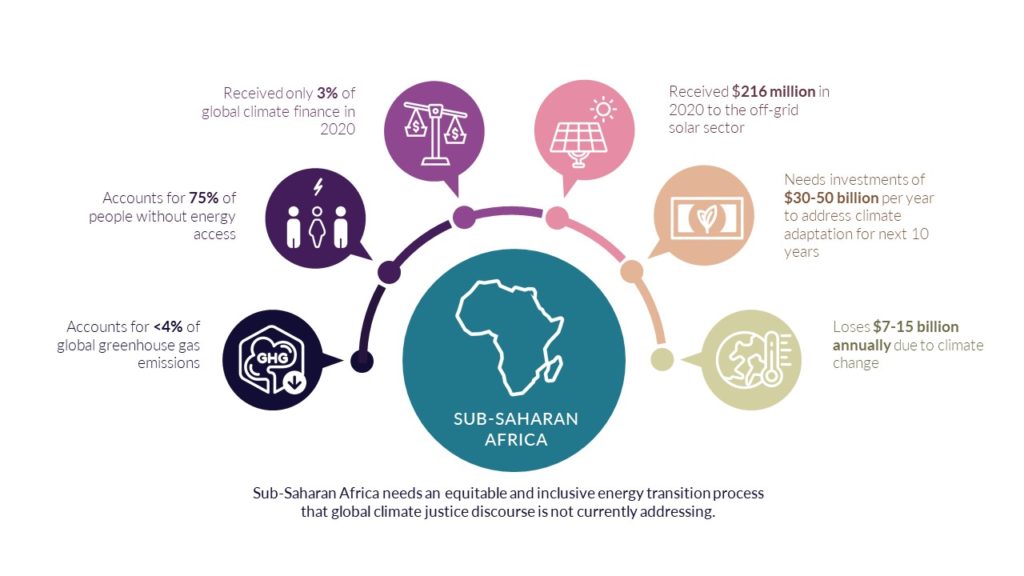At the 2015 Paris Climate Agreement, developed economies promised to deliver $100 billion per year to help cover developing countries’ climate change adaptation and energy transition costs. This has not happened. Recent commitments coming out from COP26 have been focused almost entirely on emissions reduction and fail to address issues directly affecting climate-vulnerable populations, including the urgent need to achieve universal energy access. This pulls attention away from low-emitting, energy-poor countries like those in Sub-Saharan Africa, where 75% of people without energy access live (Blankenship and Golubski). We need to collectively commit to tackling what local advocates, African climate activists, and thought leaders have been saying for years—that resources have not been allocated equitably and justly—and that needs to change.
Nithio was founded to direct large capital flows to rapidly push forward a just energy transition. Our AI-powered analytics allows us to identify and reach even the most vulnerable households. On top of that, our blended finance approach enables us to work with local solar energy companies who are reaching last-mile customers.
Figure 1: The need for a just energy transition by the numbers

The Challenge: Focusing investment on carbon reduction in high-emission countries does not address Sub-Saharan Africa’s climate challenges and developmental needs. Even with the minimal funding that gets allocated to Sub-Saharan Africa, there are challenges in efficiently and effectively deploying it to reach the most vulnerable.
Nithio’s Solution:
- No one is left behind: We need to gain a better understanding of affordability to ensure that everyone, including poor and/or women-led households, is reached. Nithio’s approach segments the market to identify households that have low ability to pay for even basic services. This enables funding to be directed to these households. Additionally, Nithio’s Risk Analytics Engine has the ability to closely monitor impact, for example using gender disaggregated data to track the number of women-led households that are reached.
- Innovative blended financing approach: Understanding household ability to pay is the first step. The next is to ensure that those households can still be reached. Nithio’s blended finance approach ensures that subsidies, grants and concessional funding are able to be allocated towards households that will not be reached by a commercial solution. This enables more households to access affordable clean energy and ensures that off-grid providers do not become overextended trying to reach non-commercial customers.
- Focus on climate adaptation by scaling products equitably: Climate change disproportionately impacts smallholder farmers, microentrepreneurs, and households unequipped for climate adaptation. By using geospatial data on climate vulnerability metrics, Nithio identifies localized populations to ensure communities equitably have access to the appliances they need to adapt their current businesses or adjust to more financially stable ones.
Figure 2: Using geospatial data such as electricity access, environmental degradation, and poverty, Nithio identifies communities most vulnerable to climate change

Without question, there needs to be significant investment in reducing emissions in the countries that have contributed most to the climate crisis. However, it is unjust to ignore the countries that have contributed the least to emissions, but will disproportionately bear the cost of climate change. In order to ensure a just transition, Nithio created the infrastructure to deliver capital at scale through a data-driven blended finance model so that we can reach the underserved communities most vulnerable to climate change.
Sources:
African Development Fund. “Africa Must Not Be Short-Changed by Climate Finance, Says Expert Panel at COP24.” African Development Fund, 18 Dec. 2018, https://www.afdb.org/fr/news-and-events/africa-must-not-be-short-changed-by-climate-finance-says-expert-panel-at-cop24-18884
Blankenship, Mary, and Christina Golubski. “Figure of the Week: Increasing Access to Electricity in Sub-Saharan Africa.” Brookings, 18 June 2021, https://www.brookings.edu/blog/africa-in-focus/2021/06/18/figure-of-the-week-increasing-access-to-electricity-in-sub-saharan-africa/
“Investment Data.” GOGLA, 1 Apr. 2021, https://www.gogla.org/access-to-finance/investment-data
“UN-Backed Report Reveals Rising Climate Change Risk across Africa.” United Nations, United Nations, 18 Oct. 2021, https://news.un.org/en/story/2021/10/1103362


Recent Comments